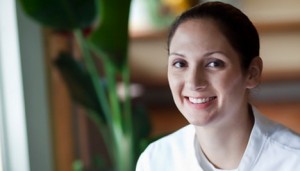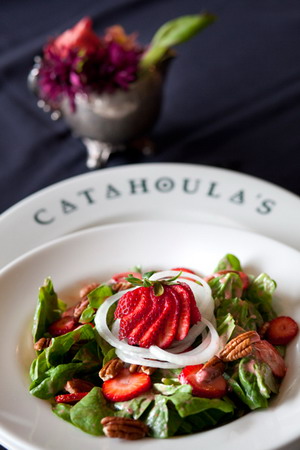 Each time I visit Grand Coteau, I am taken aback by the beauty of the majestic alleys of oaks, lush gardens, and historic architecture reflecting the Creole, French, Acadian, and Victorian styles. More than 70 structures are designated on the National Register of Historic Places in this small, picturesque town of little more than 1,000 residents in St. Landry Parish. While driving through the quiet streets at dusk, the sight of the massive, bending trees draped with long strands of Spanish moss blowing in the breeze, and the smell of flowers flourishing in the soil inspire a peaceful serenity that soothes the soul.
Each time I visit Grand Coteau, I am taken aback by the beauty of the majestic alleys of oaks, lush gardens, and historic architecture reflecting the Creole, French, Acadian, and Victorian styles. More than 70 structures are designated on the National Register of Historic Places in this small, picturesque town of little more than 1,000 residents in St. Landry Parish. While driving through the quiet streets at dusk, the sight of the massive, bending trees draped with long strands of Spanish moss blowing in the breeze, and the smell of flowers flourishing in the soil inspire a peaceful serenity that soothes the soul.
Most of Grand Coteau’s shops and restaurants are situated in renovated, historic buildings, including the recently reopened Catahoula’s. An impressive fine dining establishment, it is housed in an early 1900s renovated country store. The new owner, Rachel Leckelt, is a gifted chef who trained at Le Cordon Bleu in Paris. She flourished as a restaurant chef, a personal chef, and as a cooking instructor at various locations throughout the U.S.
Prior to recently moving to the tiny town of Sunset near Grand Coteau, Chef Leckelt taught cooking classes at Williams Sonoma and owned a boutique catering company in Houston; her parents live in New Orleans, and she graduated from LSU with a degree in food science from the College of Agriculture. Chef Leckelt has a five-acre heirloom farm in Sunset, where she harvests the fresh produce from which her seasonal French and Cajun-inspired dishes are created. “We have fruit trees but they are not producing just yet,” says Leckelt, who regularly visits partner farms with her culinary team.
Opened in March, Catahoula’s has already amassed a loyal foodie following, including regulars throughout Acadiana as well as people who drive long distances to experience the exceptional French-meets-Louisiana cuisine. The menu appears in both French and English. The restaurant takes it name from Louisiana’s state dog, a breed that descended from the infamous war dogs of Hernando do Soto’s 1539 journey to the New World; it is the only native domesticated North American breed of dog developed by Indians and early settlers.
Local photographer John Slaughter’s pictures of the dogs, with their piercing blue eyes and leopard coats, adorn the charming restaurant, which has creaky, original wood flooring. Diners gaze through picture windows at beautiful St. Charles College across the street while savoring such appetizers as char-grilled oysters, a plate of impressive artisan French cheeses (not usually seen in these parts), homemade pâté served with a wild berry compote, and thinly sliced eggplant topped with plump shrimp in a garlic cream velouté garnished with ribbons of sautéed Portobello mushrooms.
 Fronted by rows of oak trees, St. Charles College offers retreats for the community and visitors from afar through its Jesuit Spirituality Center, which specializes in personally directed retreats based on the spiritual exercises of St. Ignatius Loyola. Constructed in 1837, the original college building was destroyed by a fire, and the present building was completed in 1909.
Fronted by rows of oak trees, St. Charles College offers retreats for the community and visitors from afar through its Jesuit Spirituality Center, which specializes in personally directed retreats based on the spiritual exercises of St. Ignatius Loyola. Constructed in 1837, the original college building was destroyed by a fire, and the present building was completed in 1909.
Grand Coteau and Catholicism have been deeply connected for more than 175 years. Just down the street from Catahoula’s and the college is the renowned Academy of the Sacred Heart, which opened as a Catholic all-girls school in 1821; it is part of a network of 21 girls’ schools in the U.S. and associated Catholic institutions in 44 countries around the globe.
The settlement that grew up around the two schools was originally called St. Charles Town, but later became Grand Coteau. The alley of oak trees that runs from the front gate of Sacred Heart to the town was planted by the first Jesuit rector of St. Charles College to protect the priests from the blazing heat as they rode on horseback between the college and Sacred Heart. In the early 1800s, the town had an inn where stagecoaches changed horses en route from Washington to St. Martinville.
“We decided to move here and enroll our daughter at Sacred Heart,” says Chef Leckelt. “Catahoula’s had been closed for a year and a half. I saw the building and I fell in love with it. I just couldn’t leave it alone,” she says. Among Chef Leckelt’s dinner entrées, my top picks include such French-inspired dishes as the superb red wine-braised duck, a savory mushroom ragout, and the luscious lump crabmeat cheesecake baked in a cheese custard and served over a roasted red pepper coulis. Other good choices include the succulent grilled filet mignon drizzled with a smooth sabayon sauce (ask for a topping of lump crabmeat), and farm-raised roast chicken with artichokes and chèvre that is finished with a heady l’estragon sauce. For vegetarians, try delicious vegetable lasagna, made with ingredients fresh from the chef’s own farm. “We also have an herb garden out back,” she notes.
“We are really good at creating dishes for special dietary needs,” Chef Leckelt points out. “We can do vegan, gluten-free, dishes for diabetics, and can accommodate any off-the-menu requests.”
The lunch menu offers both refined dishes and casual fare, including turkey wraps, a wonderful spinach salad with thinly sliced strawberries in a champagne vinaigrette, and a grilled Panini with fresh basil and Provolone cheese. Sunday brunch begins with seasonal fruit and freshly baked breads brought to the table, followed by a choice of dishes such as eggs St. Charles glossed with a flawless béarnaise sauce, pain perdu topped with berries, Belgian waffles, vegetable quiche, pecan pancakes, and fluffy French omelets.

























